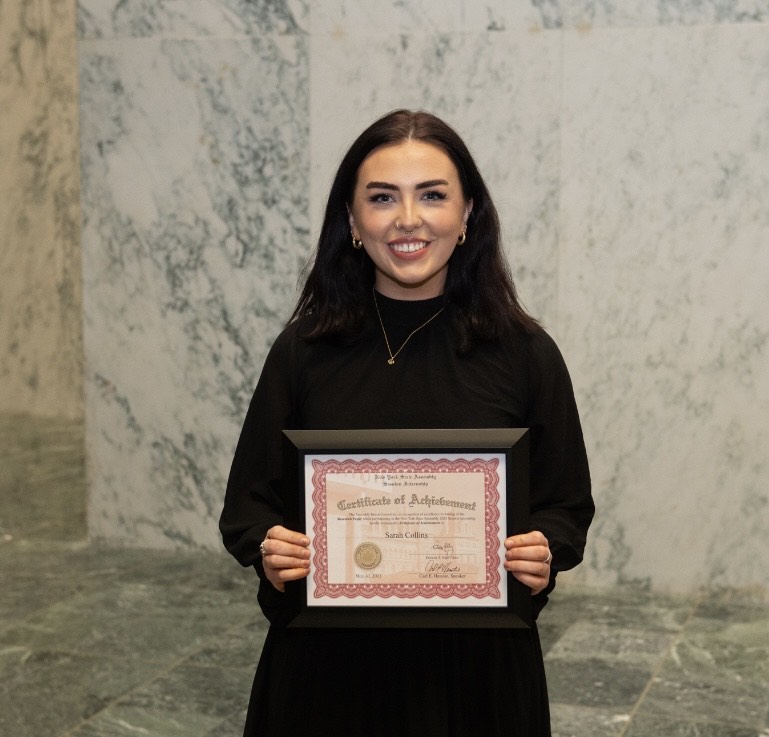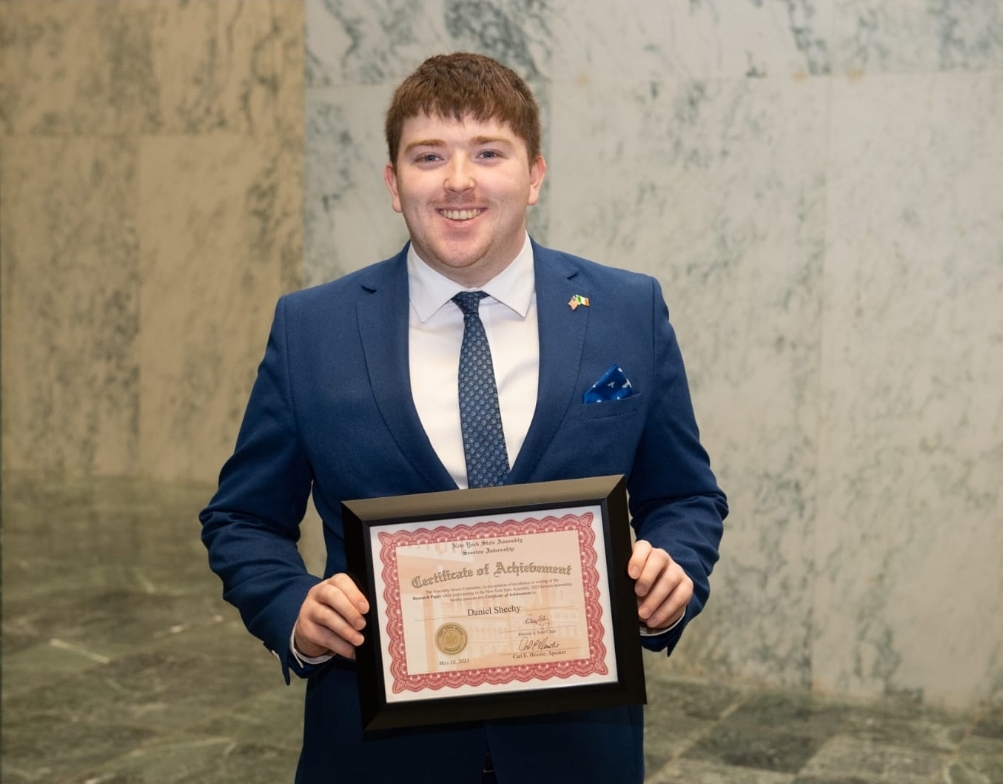| Code | CK122 |
|---|---|
| Duration | 4 Years |
| Teaching Mode | Full-time |
| Qualifications | BSc (Hons) |
| NFQ Level | Level 8 |
| CAO Points | 2025: 411 |
| CAO Points Range | 2025: 411-598 |
Course Outline
Students of the four-year BSc Government and Political Science will be the political and business leaders of tomorrow and a vital part of the generation that shapes the 21st century.
This degree combines political science with a range of subjects in business, law, modern languages, social sciences and information technology. It also offers a work placement in Year 3, including prestigious internships in the New York State Legislature and the New York State Senate, as well as other highly prized placements in international and national institutions.
Now more than ever the study of government and politics is crucial. Politics affects everyone. Aristotle called politics the master science for a reason – he understood that through politics, the future of the world is shaped.
Political science is the study of governments, public policies and political processes, systems and political behaviour. There is no single reason to study politics. You may have an interest in the workings of government or some questions about the civic nature of our society. Or some event – either domestic or international – may arouse your interest, making you want to know more than you can learn through television or newspapers.
Studying politics means studying the real world and developing the skills to make sense of that world. A degree in political science will prepare you for many forms of employment or further study. You will gain analytical and practical skills, invaluable in today’s competitive employment market. Political science graduates are recognised as flexible people who can fit into a variety of positions in modern life.
A degree in political science will equip you for all sorts of careers: political activity, management, retail, banking, government departments, local government and international organisations. Political science graduates work in the media and for pressure groups, become consultants and go on to lecturing and research posts at universities.
Studying political science provides you with many choices when you graduate.
Year 1 Modules
Core Modules
- GV1202 Politics of the European Union (5 credits)
- GV1204 Democracy, Ideology and Utopia (5 credits)
- GV1207 Politics and Government of Ireland (5 credits)
- GV1215 Local Government and Politics of Ireland (5 credits)
- GV1216 Analytical Thinking Skills in Political Science (5 credits)
- GV1217 Introduction to Political Science (5 credits)
- GV1218 International Politics (5 credits)
- LW1316 Public Law (5 credits)
- MG1010 Public and Private Management (5 credits)
- SS1302 Social Policy Analysis (5 credits)
Elective Modules (choose 10 credits)
- AC1100 Introduction to Accounting (5 credits)
- CH1001 Chinese Language (Mandarin) I (10 credits)
- EC1203 Macroeconomic Context and Business (5 credits)
- FE1024 Introduction to Development Economics (5 credits)
- FE1400 Local Development and Public Health (5 credits)
- FR0105 Introduction to French (5 credits)
- FR1005 French for Near Beginners (5 credits)
- FR1105 Threshold French (5 credits)
- FR1107 French for Reading Purposes I (5 credits)
- GA1002 Ceart na Gaeilge idir Scríobh agus Labhairt (10 credits)
- GE0003 German Language (Beginner Level A1) Part 1 (5 credits)
- plus GE0004 German Language (Beginner Level A1) Part 2 (5 credits)
- GE0005 German Language (CEFR-Level A2.1) (5 credits)
- GE0008 German Language (CEFR-Level A2.2) (5 credits)
- HS0028 Spanish Language (Beginner Level) (10 credits)
- HS0128 Spanish Language (Improver Level) (10 credits)
- IS1106 Introduction to Information Systems (5 credits)
- IS1107 Information Systems for the Networked Enterprise (5 credits)
- IT1102 Non-Beginners' Written and Spoken Italian (10 credits)
- IT1109 Introduction to Written and Spoken Italian (10 credits)
- MG1004 Principles of Management and Organization (5 credits)
Academic Programme Catalogue
See the Academic Programme Catalogue for the complete and up-to-date content for this course. Note that the modules for all courses are subject to change from year-to-year. For complete descriptions of individual modules, see the Book of Modules.
Course Practicalities
This course involves about 12 hours of lectures each week, as well as tutorials, field trips, and guest lectures.
Assessment
Written exams will take place before Christmas and in May. Not all modules will have formal examinations. Many modules use other types of assessment including essays, oral presentations, podcasts, research reports, social media analyses, submissions to government, letters to editors, and poster design.
Why Choose This Course
- The BSc in Government and Political Science offers a unique combination of politics, business, and law.
- Work placement has been an integral part of the degree since its establishment in 1999.
- Graduates are equipped for a wide variety of careers in politics, management, retail, banking, government departments, local government, voluntary groups, and journalism.
- The Department of Government attracts guest speakers from the world of politics including – over the past decade – John Hume, President Mary McAleese, Emily O’Reilly, John Bercow, David Norris, Ivana Bacik, and former Taoiseach Enda Kenny.
The degree is both intellectually stimulating and practically oriented. We place a strong emphasis on practice as well as theory throughout the course.
You will undertake a considerable amount of project work that will require you to use your initiative in searching for data and information and in conducting research and analysis. Consequently, you are equipped to contribute in a real work environment.
Placement or Study Abroad Information
A 14-week work placement is an integral part of the BSc Government and Political Science. Students undertake a work placement in Year 3 of the degree, at home or abroad. Recent student placements have included the civil service, government agencies, New York State Assembly, New York State Senate, Scottish Parliament, the European Parliament, banks, insurance companies, media organisations, PR companies, humanitarian groups, health boards, and local government. See our Workplace Alumni page for more details.
The BSc Government and Political Science also has strong links with the Washington-Ireland Programme (WIP) and the George Mitchell Scholarship Programme.
Skills and Careers Information
The BSc Government fed my passion for politics & set the groundwork for my subsequent career. I gained a conceptual understanding of politics & business and an abundance of transferable skills... Brian Crowley, Graduate & Former MEP
The excellent transferable skills acquired in the BSc Government and Political Science open up many career paths. Our graduates work in different fields, including:
- Public service (home and abroad)
- Civil service (home and abroad)
- International organisations
- National parliaments and local government
- Political parties
- Public affairs
- Lobbying
- Journalism
- Television
- Voluntary sector
Requirements
Leaving Certificate Entry Requirements
At least six subjects must be presented. Minimum grade H5 in two subjects and minimum grade O6/H7 in four other subjects. English and Irish are requirements for all programmes unless the applicant is exempt from Irish.
Applicants will need to meet the following minimum entry requirements:
| English | Irish | Other Language |
|---|---|---|
| O6/H7 | O6/H7 | O6/H7 |
EU/EFTA/UK Qualifications
EU/EFTA/UK applicants presenting an equivalent school-leaving qualification should review the EU/EFTA/UK Applicants page for information on equivalent grades and how to prove their level of English.
Mature Students
To compete through the mature entry route, applicants must be 23 years of age on or before 1 January of the application year and apply online via the CAO by 1 February. The application should include a statement of interest, and applicants may also be called for interview. Candidates must have an interest in current affairs/politics.
Further information on applying as a mature student is available on the Mature Applicants and Mature Student Entry support pages.
QQI FET Entry
Applicants who meet the required level of distinctions in required subjects can apply for entry to this course using specific QQI FET qualifications. Please review the Programme Requirements on our Information for QQI FET Applicants page for information on related QQI courses, and visit Access UCC’s QQI/FET Entry section for further support.
Non-EU Applicants
Non-EU applicants are expected to have educational qualifications of a standard equivalent to the Irish Leaving Certificate. In addition, where such applicants are non-native speakers of the English language they must satisfy the university of their competency in the English language.
To verify if you meet the minimum academic and language requirements visit our qualification comparison page and refer to our International Office page for more information.
Fees and Costs
- Whether you are an EU or Non-EU student will affect the course fees applicable to you. See more information on EU Fees, Non-EU Fees, or Free Fees Status.
- The State will pay the tuition fees for EU students who are eligible under the Free Fees Scheme. The annual student contribution and capitation fees are payable by the student.
- See the Fee Schedule to find out the course fee.
- Check out scholarships that may be available to you.
- Explore our Nurturing Bright Futures free online course (Module 5) to learn about managing your money as a student and budgeting for university life.
How To Apply
Irish and European (EU/EFTA/UK) Applicants
Apply via the CAO. See the CAO Handbook for useful information on applying through the CAO.
Mature Applicants
Apply via the CAO by 1 February. To apply for a place as a mature student, you must be 23 years of age on or before 1 January of the year of entry.
QQI/FET Applicants
Apply via the CAO. See our QQI/FET Applicants page for information on the Quality and Qualifications Ireland (QQI) Further Education and Training (FET) application process and whether there are routes available to this course.
Non-EU Applicants
If you are from outside the EU/EFTA/UK, apply online via the UCC Apply portal. See our International Office page for more information.





